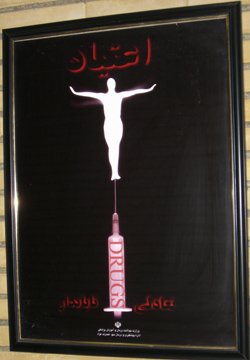Navigation auf uzh.ch
Navigation auf uzh.ch
Responsible for the doctoral project: Dr. David Arn (doctoral thesis 2010)
Funded by: URPP Asia and Europe
Project duration: March 2006 – February 2009
Tutor: Prof. Dr. Andreas Kaplony
Research Field: Entangled Histories

For centuries Iran has been suffering from a high addiction rate to
opiates. Directly after the revolution the Islamic authorities first reacted on
this widespread problem with harsh, repressive measures, yet without success.
Hence, they started to rethink their drug policy. Today Iran is distributing
clean syringes, methadone and even opium tincture to drug addicts, the
launching of which is commonly attributed to president Khatami (1997-2005).
The present PhD thesis examines with the methodology of discourse
analysis, how this shift in the official drug policy is reflected in the public
discourse on drugs. The analysis of drug related newspaper articles, which
appeared between 1995-2000, indeed shows that a major reorientation in the
press takes place with the inauguration of the reformist administration. As
such the drug discourse can be seen as an indicator for the general reformist challenge
to the earlier ideological rigidity. Yet, the analysis also reveals that the
Iranian press had started to discuss more – and more critically – about drug
policy even before Khatami’s election, in particular the newspapers of the
pragmatic conservatives around president Rafsanjani. These were significantly
influencing the new reformist newspapers, but also those of the radical
conservatives.
Although as a rule Iranian newspapers are organs of respective political or ideological groups, the press had developed a new self-perception of an independent control entity vis-à-vis the government, or as a “fourth power” in these years. The driving force behind this pragmatic, critical and accountable coverage certainly first was the moderate conservative and then the reformist press. But all newspapers had their impact on the new public drug discourse. This mutual influence also explains, why the press has been continuing to report critically on drugs and drug policy even after the clampdown on the reformist press.